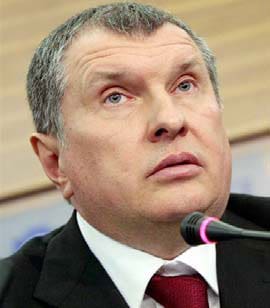 |
|
Sechin: Russia’s deputy prime minister and Rosneft chairman |
In a signal that the Russian government is increasingly aware of the financial constraints it is facing, a top Kremlin adviser said that the state would not be bailing out any more debt-burdened companies.After burning through $200 billion in foreign currency reserves since August, and with GDP plummeting 8.8% year-on-year in January, it appears likely that the economic crisis is not yet close to hitting bottom in Russia. The Kremlin is clearly wary of giving too much more cash to the corporate sector, which collectively owes around $130 billion in short-term debt falling due in 2009. That said, it is clear that so-called strategic companies and national champions—including Gazprom and Rosneft, for starters—will be supported regardless, as will the banking sector.
A grand plan floated by the Kremlin to form a Russian metals champion consisting—at a minimum—of domestic metals giants Rusal, Norilsk Nickel and Metalloinvest, was scrapped in late February. But the Russian government clearly has corporate nation-building on its mind, to the possible detriment of minority shareholders in targeted companies. Subsequent rumors focused on a union between state oil company Rosneft and Surgutneftegas. Such a merger, long backed by deputy prime minister (and Rosneft chairman) Igor Sechin, would create the world’s largest oil company.
President Dmitry Medvedev announced the launch of a five-year program to reform and develop Russia’s civil service, with the broader aim of fighting corruption. According to Transparency International, corruption in Russia is at its worst level in eight years. Few observers expect significant improvement on the back of Medvedev’s efforts.
Party of power United Russia, headed by prime minister Vladimir Putin, was, not surprisingly, the big winner in local and municipal elections in early March. Turnout was lower than anticipated, though.
A grand plan floated by the Kremlin to form a Russian metals champion consisting—at a minimum—of domestic metals giants Rusal, Norilsk Nickel and Metalloinvest, was scrapped in late February. But the Russian government clearly has corporate nation-building on its mind, to the possible detriment of minority shareholders in targeted companies. Subsequent rumors focused on a union between state oil company Rosneft and Surgutneftegas. Such a merger, long backed by deputy prime minister (and Rosneft chairman) Igor Sechin, would create the world’s largest oil company.
President Dmitry Medvedev announced the launch of a five-year program to reform and develop Russia’s civil service, with the broader aim of fighting corruption. According to Transparency International, corruption in Russia is at its worst level in eight years. Few observers expect significant improvement on the back of Medvedev’s efforts.
Party of power United Russia, headed by prime minister Vladimir Putin, was, not surprisingly, the big winner in local and municipal elections in early March. Turnout was lower than anticipated, though.
—Kim Iskyan



